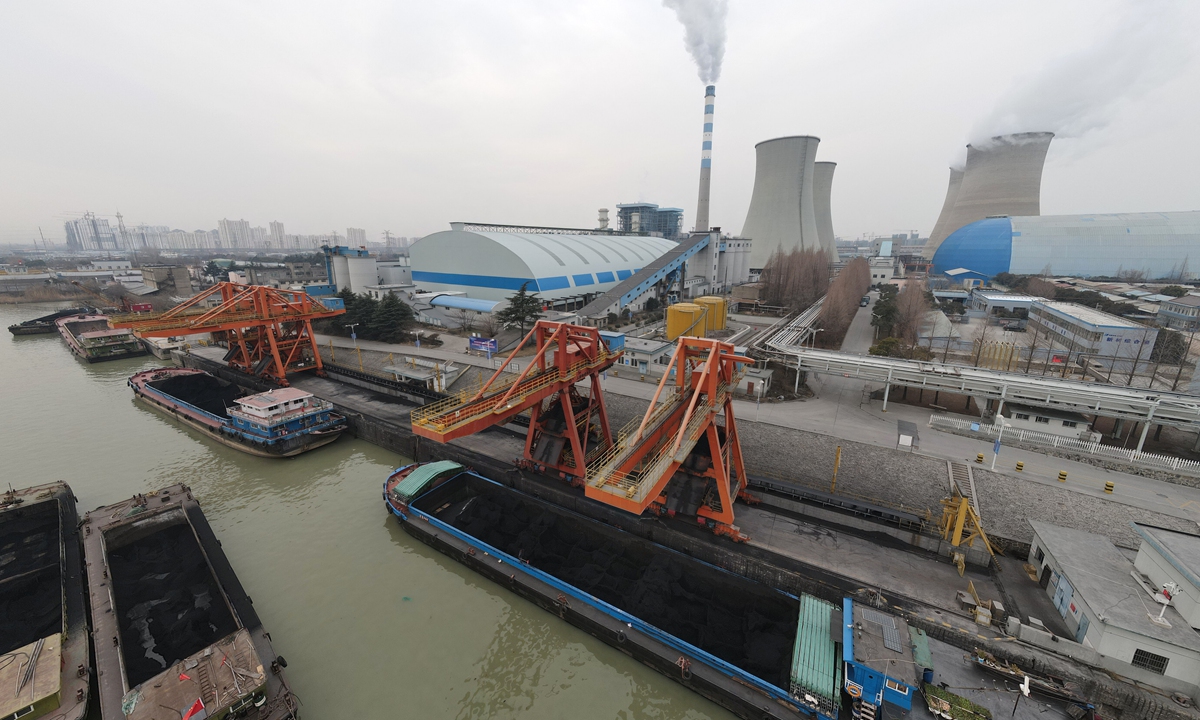
Coal ships berth at the wharf at a power plant in Yangzhou, East China's Jiangsu Province. The 1,000-year-old Grand Canal has become a key transportation artery for vessels loaded with coal in central China to sail south to allow coal-fired plants there to generate more electricity as power demand soars in bitter winter weather. Photo: VCG
China's National Development and Reform Commission (NDRC), the top economic planner, on Tuesday announced plans to improve the country's coal-fired power pricing mechanism with measures such as expanding the fluctuation range for power prices - a move that experts say will help balance China's power demand and supply and ease power shortages.
According to an NDRC statement, the floating range of market-based electricity transaction prices in principle will be adjusted to a two-way range of 20 percent, compared with the current ceiling of 10 percent and a 15 percent floor. Rates for coal-fired electricity for energy-intensive enterprises are not restricted by the 20-percent fluctuation limit.
The NDRC will also urge all industrial and commercial users to buy electricity from the market, while liberalizing pricing for thermal power. About 70 percent of China's coal-fired electricity is priced via market trading currently, and that will ultimately rise to 100 percent, an official of the NDRC said at a press conference on Tuesday, without disclosing a time frame.
The NDRC stressed that China won't change electricity rates for households, agriculture and public welfare industries.
China moved to liberalize its thermal power pricing mechanism after power crunches in recent weeks, as a surge in global energy prices pushed the costs of domestic power plants higher and made them reluctant to generate power.
To cope with the situation, a number of provinces and regions imposed power curbs on local businesses, particularly manufacturing plants. In some areas, companies are only allowed to use power one day each week, according to media reports.
Experts described the NDRC's measures as the most important power reform in China's history, saying that they would help balance the use of power in the country, which in the past has tilted toward energy-intensive enterprises like factories.
However, the reforms may add pressure on these energy-intensive companies, as they will face increasing operational costs that will erode their profits in the short term, independent industrial analyst Wu Chaoming told the Global Times.
"For many aluminum producers, power costs account for nearly 30-50 percent of their operating overheads, while their profit margin is at a very thin level of only 1-3 percent. The power pricing mechanism change will hit their money-making space," Wu said.
However, seen from a broader perspective, such adjustments will help solve China's power crunch at large by bringing balance to the consumption side, experts said.
"Scrapping the limit on how much power rates can fluctuate for energy-intensive companies will push them to curb consumption, making Chinese companies' access to power supplies more balanced," Lin Boqiang, director of the China Center for Energy Economics Research at Xiamen University, told the Global Times. "If the policies are executed well, I expect the power shortage to be corrected soon," he said.
Peng Shaozong, an official at the NDRC, also noted at the press conference on Tuesday that the new power pricing mechanisms will give market forces more say and "suppress unreasonable power demand."
Experts said that the measures are necessary, as they will help reduce the current power restrictions, thus bringing industrial and economic growth back on track.
"China still has plenty of overseas orders, and such a robust trade situation should not be affected by difficulties in power supplies," Tian Yun, former vice director of the Beijing Economic Operation Association, told the Global Times on Tuesday.
He also noted that if the trade boom persists, it will increase local governments' revenues and help them shake off reliance on real estate income, which is important to the country's deleveraging initiative and financial security.




